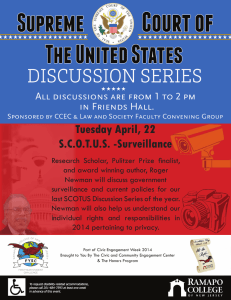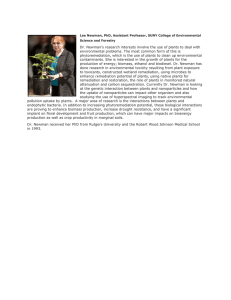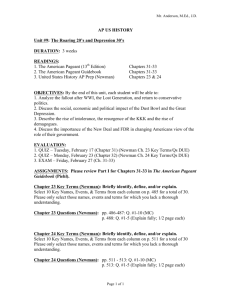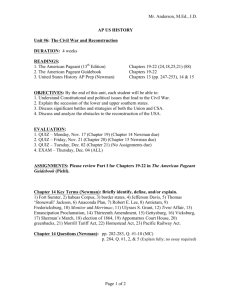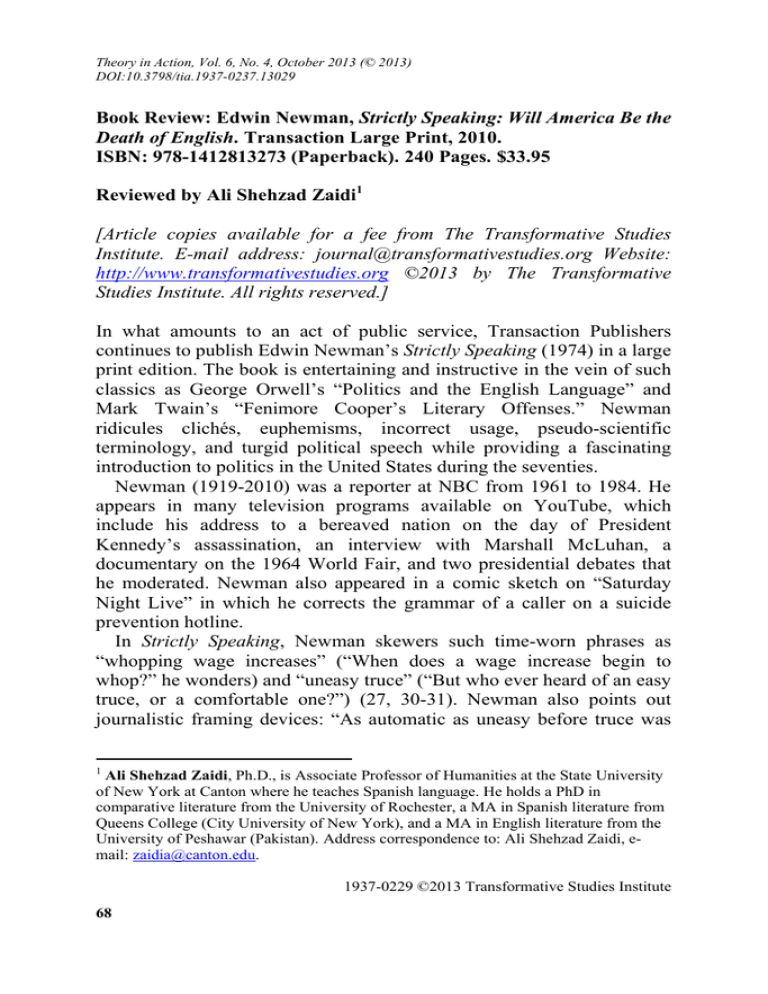
Theory in Action, Vol. 6, No. 4, October 2013 (© 2013)
DOI:10.3798/tia.1937-0237.13029
Book Review: Edwin Newman, Strictly Speaking: Will America Be the
Death of English. Transaction Large Print, 2010.
ISBN: 978-1412813273 (Paperback). 240 Pages. $33.95
Reviewed by Ali Shehzad Zaidi1
[Article copies available for a fee from The Transformative Studies
Institute. E-mail address: journal@transformativestudies.org Website:
http://www.transformativestudies.org ©2013 by The Transformative
Studies Institute. All rights reserved.]
In what amounts to an act of public service, Transaction Publishers
continues to publish Edwin Newman’s Strictly Speaking (1974) in a large
print edition. The book is entertaining and instructive in the vein of such
classics as George Orwell’s “Politics and the English Language” and
Mark Twain’s “Fenimore Cooper’s Literary Offenses.” Newman
ridicules clichés, euphemisms, incorrect usage, pseudo-scientific
terminology, and turgid political speech while providing a fascinating
introduction to politics in the United States during the seventies.
Newman (1919-2010) was a reporter at NBC from 1961 to 1984. He
appears in many television programs available on YouTube, which
include his address to a bereaved nation on the day of President
Kennedy’s assassination, an interview with Marshall McLuhan, a
documentary on the 1964 World Fair, and two presidential debates that
he moderated. Newman also appeared in a comic sketch on “Saturday
Night Live” in which he corrects the grammar of a caller on a suicide
prevention hotline.
In Strictly Speaking, Newman skewers such time-worn phrases as
“whopping wage increases” (“When does a wage increase begin to
whop?” he wonders) and “uneasy truce” (“But who ever heard of an easy
truce, or a comfortable one?”) (27, 30-31). Newman also points out
journalistic framing devices: “As automatic as uneasy before truce was
1
Ali Shehzad Zaidi, Ph.D., is Associate Professor of Humanities at the State University
of New York at Canton where he teaches Spanish language. He holds a PhD in
comparative literature from the University of Rochester, a MA in Spanish literature from
Queens College (City University of New York), and a MA in English literature from the
University of Peshawar (Pakistan). Address correspondence to: Ali Shehzad Zaidi, email: zaidia@canton.edu.
1937-0229 ©2013 Transformative Studies Institute
68
Theory in Action
Marxist before the title of the late President Allende of Chile. You would
have thought that Marxist President was the position Allende had run for
and been elected to” (32).
Some of the clichés highlighted by Newman (i. e., “eyeball to eyeball
confrontation” and “paper tiger”) (35) are mercifully obsolete. He also
pillories the professional jargon of newscasters who speak of “major
thunderstorm activity” instead of “major thunderstorms” and of
psychologists who consider children to be in “a play situation” rather
than at play. (30) The vocabulary of the social sciences
(“misspecification,” “disaggregates,” etc.) appears to have earned, at
least in the mind of Newman, its users a special place in Hell.
Nonetheless, sloppy constructions, such as “partially surrounded” and
“totally unique,” may well endure as long as the English language. For
Newman, insipid language resembles background elevator music that
“that incessantly encroaches on us [and] thumps and tinkles away,
mechanical, without color, inflection, vigor, charm, or distinction” unlike
the “wisecracks, accurate descriptions, precise formulations of ideas
[that] brighten the world” (21). In a sequel, A Civil Tongue (1976), he
elaborates further:
A civil tongue… means to me a language that is not bogged down in
jargon, not puffed up with false dignity, not studded with trick
phrases that have lost their meaning. It is not falsely exciting, is not
patronizing, does not conceal the smallness and triteness of ideas by
clothing them in language ever more grandiose, does not seek out
increasingly complicated constructions, does not weigh us down
with the gelatinous verbiage of Washington and the social
sciences… It is direct, specific, concrete, vigorous, colorful, subtle,
and imaginative when it should be, and as lucid and eloquent as we
are able to make it. It is something to revel in and enjoy. (6)
In Strictly Speaking, Newman relates language to democracy,
observing that “those for whom words have lost their value are likely to
find that ideas have also lost their value.” (6) However, Newman
understands that good language usage has its limits, wondering, for
example, whether grammarians were less fooled by the Gulf of Tonkin
affair – the fabricated incident that President Johnson used to escalate the
war in Vietnam – than were other people (8). Newman identifies several
euphemisms to which Vietnam gave rise: “protective reaction strike,
surgical bombing, free-fire zone, interdiction, contingency capability,
New Life Hamlet,” which, he informs us, “in sterner days was a refugee
69
Ali Shehzad Zaidi
camp.” “Incursion” is another infamous euphemism, used to describe the
invasion of Laos (79-80).
Indeed, The Vietnam War created language befitting an automaton.
Newman accordingly describes Secretary of Defense Robert McNamara:
“Clicking and whirring sounds would be heard; he would look
uncomfortable; and out would come a readout advocating an electronic
fence along the border between the two Vietnams” (68). According to
Nick Turse, author of a recent history on Vietnam, McNamara
exemplified the mindset of the “thoroughly corporatized, quantitatively
oriented system that the sociologist James William Gibson astutely calls
‘technowar’” (41). A more sensitive side of McNamara emerges in the
documentary The Fog of War in which he expresses something that
approaches remorse for his conduct of the war.
Federal officials created barriers to knowledge that led to conflict.
Newman recalls that Secretary of State Dean Rusk testily asked
reporters, “Which side are you on?” Newman assures us that “they were
where they should have been, on the side of accurate reporting” (75).
Today such an assurance would be less tenable, thanks to the
consolidation of media and the decline of investigative reporting.
Newman notes that the Vietnam War led youth to revolt against
authority and convention, especially in language. Although he
understands the disillusionment with “people of age and experience,” as
he calls them, Newman chastises youthful artistic and musical taste: “I
have no wish to impair my hearing by listening to their music, and a
communication gap between an electronic rock group and me is
something I devotedly cherish and would hate to see disappear” (12).
Strictly Speaking introduces us to inane political expression during the
seventies. Newman pillories the fatuous use of alliteration by politicians
such as Governor Mark Hatfield, who in a speech to the 1960 Republican
National Convention praised Richard Nixon for having “demonstrated
courage in crisis from Caracas to the Kremlin” (116), as well as Vice
President Spiro Agnew, who is lampooned for expressions, dreamt up by
White House speech writers, such as “pampered prodigies,” “vicars of
vacillation,” and “nattering nabobs of negativism” (1-2).
According to Newman, the Watergate hearings, which led to President
Nixon’s resignation in 1974, revealed “a poverty of expression, an
inability to say anything in a striking way, an addiction to a language that
was almost denatured, and in which what little humor did occur was
usually unintentional” (8). Newman understands that clichés and
obfuscation reflect the mediocrity and corruption of those in power,
pointing out that “in Washington, as we learned from the White House
70
Theory in Action
transcripts, a president may speak of kicking butts, call a problem a can
of worms, decide not to be in the position of basically hunkering down,
anticipate something hitting the fan” (9).
Newman’s book highlights the importance of good writing to a
democracy. It epitomizes journalism in the public interest, the kind that
has given rise to such prophetic and dissident voices as Chris Hedges.
Notably, a number of renowned American novelists, including Ernest
Hemingway, John Dos Passos, Theodore Dreiser, and Sinclair Lewis,
were once journalists. Strictly Speaking remains a treat to be savored
nearly four decades after it was first published.
*****
POSTSCRIPT
As I completed this review in late August 2013, faculty at my college
received an email from librarians listing two thousand books in language
and literature slated for removal from the SUNY Canton library. Among
the titles is Strictly Speaking. A week later, the librarians sent the faculty
a list of serials to be eliminated. Among them is Theory in Action, the
journal in which this book review appears.
WORKS CITED
The Fog of War. Dir. Errol Morris. Sony Pictures Classics, 2003. Film.
Newman, Edwin. A Civil Tongue. Indianapolis: Bobbs-Merrill, 1976.
–––––––––––. Strictly Speaking, Somerset, New Jersey: Transaction
Publishers, 2010 (Originally Published in 1974).
Turse, Nick. Kill Anything That Moves. New York: Metropolitan Books,
2013.
71

